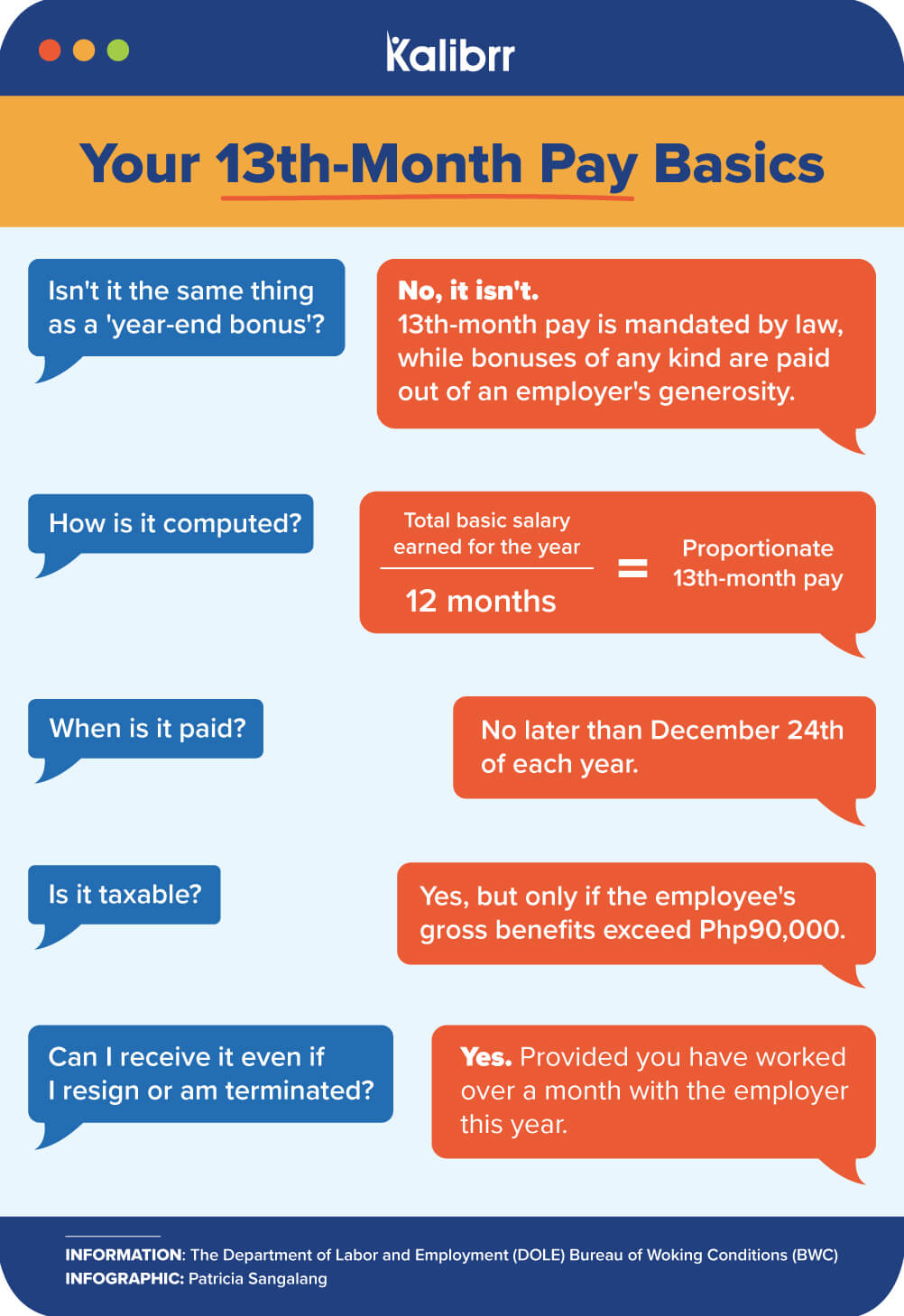Eight Often-Asked Questions About 13th Month Pay, Answered

While we all surely appreciate the yearly payout, it’s also good to know the rhyme and reason behind the extra month’s worth of salary
It’s that time once again in the Philippines when, while most of the majorly-Catholic country is observing the holiday season, many are also anticipating a slight bump in their income as a result of receiving their thirteenth-month pay.
Yet, there really isn’t a thirteenth month on the calendar– so why are many of us receiving pay for one? This may be one of the things you’ve at one point wondered about as you get your 13th-month pay.
And, even if you haven’t and are only concerned with how much your payout this year, it’s good to know about the how and why behind it to avoid being shortchanged or encountering other problems regarding your “extra” salary.

TOPICS
Am I eligible for 13th-month pay?
If you are new to your company or new to working in general, it’s understandable if you are unsure if you are eligible to receive 13th-month pay this year.
Pursuant to Presidential Decree (P.D.) No. 851, 13th-month pay is a mandatory benefit which employers are required by law to grant to all rank-and-file employees who have worked for at least one month in the company.
Am I considered a “rank-and-file” employee?
According to the website of the Bureau of Working Conditions of the Department of Labor and Employment (DOLE), rank-and-file employees are:
“All employees not considered managerial employees are considered rank-and-file employees. A managerial employee is one who is vested with powers or prerogatives to lay down and execute management policies and/or to hire, transfer, suspend, lay-off, recall, discharge, assign or discipline employees, or to effectively recommend such managerial actions.”
Does where and/or how I work matter?
While the law requires 13-month pay to be paid by employers, it is still not all-encompassing. Up until today, only the rank-and-file employees of private employers are eligible to receive 13th-month pay. As stated in P.D. No. 851 Section 3, the 13th-month pay law should apply to all types of employers except:
-
The Government and any of its political subdivisions, including government-owned and controlled corporations, except those corporations operating essentially as private subsidiaries of the Government;
-
Employers already paying their employees 13-month pay or more in a calendar year or its equivalent at the time of this issuance;
-
Employers of household helpers and persons in the personal service of another in relation to such workers; and
-
Employers of those who are paid on purely commission, boundary, or task basis, and those who are paid a fixed amount for performing a specific work, irrespective of the time consumed in the performance thereof, except where the workers are paid on piece-rate basis in which case the employer shall be covered by this issuance insofar as such workers are concerned.
Do keep in mind that even if you work as a government employee, freelancers, contractual worker, household helper, or employees who are paid solely on commission (real estate brokers, etc), your employer may not be required by law to provide you 13th-month pay, but no law also prohibits them from issuing a Christmas/year-end bonus that is determined/computed in a similar manner.
You can always ask your employer/HR/finance department if there are other bonuses you can expect at year-end in lieu of 13th-month pay.
But isn’t 13th-month pay and year-end bonus the same?
Because both are often paid at the end of the year, it is easy to assume that 13th-month pay and year-end/Christmas bonuses are one and the same.
However, as previously mentioned, they are different, with the latter not government-mandated. This means your company can simply give employees a bonus out of generosity but is also in no way obligated to do so unless it is officially part of your salary or the subject of an express agreement/contract.
So I qualify for 13th-month pay, when can I expect to receive it?
As per the previously mentioned P.D. No. 501, 13th-month pay should be paid no later than December 24 of each year. So if you haven’t received yours by now, you’ll likely receive it soon since Christmas is fast approaching.
The P.D. also states that employers have the discretion of releasing one-half of the 13th-month pay before the opening of the regular school year (typically in May) and the other half on or before the 24th day of December of every year. So if you’ve already received an amount a few months back, what you receive during the holiday season may be slightly less.
How do I compute my 13th-month pay?
If this is your first time earning 13th-month pay, or you already have but had never really bothered to know how your employer comes up with the value to pay you, it is actually fairly simple to compute:
Total basic salary earned for the year / 12 months = proportionate 13th-month pay
This computation from the DOLE is in line with the law that rank-and-file employees who have worked in as little as a month with a company already qualify or that the 13th-month pay shall be no less than a twelfth of the total basic salary earned by an employee within a calendar year.
Is this amount taxable?
The 13th-month pay, as stated in the Republic Act 10963, is not subject to tax. It is only taxed when the gross benefits received by employees of public and private companies do not exceed Php90,000.
In the past, this baseline was lower at Php82,000, but as a result of the TRAIN Law, it was raised to the current taxable amount.
Am I still eligible even if I’ve resigned or been terminated?
Provided you’ve worked for your employer for over a month within the year that the 13th-month pay applies, then you are eligible to receive it (if you haven’t already).
Just like it is computed for current employees, the amount you’d receive is the total basic salary you’ve earned for the year prior to leaving divided by 12 months. How and when you’ll receive it depends on the rules of your employer, but in most cases, the 13th-month pay is included in the back-pay you are issued 30 days after your last day and you’ve completed clearance procedures.
This article is not intended to serve as a full-guide about 13-month pay in the Philippines, and Kalibrr recommends professionals reach out to their employers’ HR or finance departments, or the Department of Labor and Employment, for more comprehensive information.
Need help finding that dream job? Sign up at Kalibrr and be connected to thousands of employers!
Kalibrr is a technology company that aims to transform how candidates find jobs and how companies hire talent. Placing the candidate experience at the center of everything it does, the company continues to attract the best talent from all over, with over 2.7 million professionals and counting. Kalibrr ultimately connects these talents to companies in search of their next generation of leaders.
The only end-to-end recruitment solutions provider in Southeast Asia, Kalibrr is headquartered in Makati, Philippines, with offices in San Francisco, California, and Jakarta, Indonesia. Established in 2012, it has served over 18,000 clients and is backed by some of the world’s most powerful start-up incubators and venture capitalists. These include Y Combinator, Omidyar Network, Patamar Capital, Wavemaker Partners, and Kickstart Ventures.
For application help and additional professional advice, follow Kalibrr on Facebook, Twitter, LinkedIn, and Instagram.




No comment available yet!